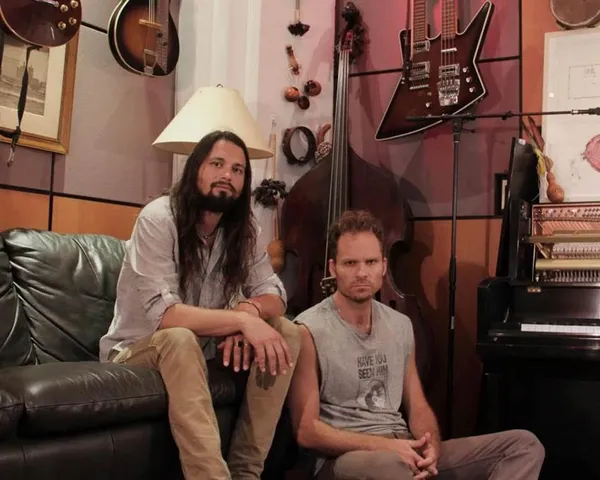 |
| "We've started turning films down because it's just not going to be something that we can contribute to. We're getting better at that. We're becoming better film critics." |
AW: The films you've scored at this year's festival are all very different in terms of their subject and approach. Perhaps we could start by talking about the sparse scoring in Christine, does that make it harder to score?
SJ: We've done a few very sparse scores. I mean, if you listen to Martha Marcy May Marlene it's pretty sparse. There's very specific moments for music.
DB: The moments are variable and crucial moments such as chapter changes or helping with specific scenes. But in a film you can only have so many of those bits and if you've got twice the number of cues, you've just got fillers in between, so it's not so hard.
AW: Christine is a Seventies period piece but the music isn't particularly noticeably of the period.
DB: There is a nod to what Seventies folk musicians might have done behind a piece – harp and woodwind and percussion but it was a hard palette to come up with because it's such a busy movie and the music, in a way, had to match her frenetic high energy. But we also had to illustrate her innocent qualities, so we chose to use percussion for that.
AW: The scoring has a news rhythm.
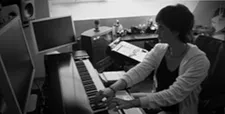 |
| SJ: 'Antonio Campos came in. He said, 'Here we'll do a tick-tock-tick-tock-tick-tock. He has his own language, you know.' |
DB: He picks up our drumsticks and started hitting things..
SJ: It's great – that's how he conveys his music sense and it's good for us, we like that. The harp was his idea. When he was shooting the movie, he sent me a text that said: 'What about harp?' It was just about the only conversation we had about it.
AW: Speaking of percussion, The Fits is percussion and woodwind driven.
DB: We have a couple of baskets full of weird little trinkets and stuff.
SJ: The Fits is all clapping and stomping and stuff.
AW: How did you come up with that, because it is a departure from more regular orchestration?
SJ: The wonderful thing about that film for us what that it was already so experimental. The pacing of it was right up our alley. We love that kind of openness. And the film is so much about the body, that we chose these instruments because of that. Woodwind has a breathy feel, we even used just breath. A little bit of percussion and stomping and stuff. The whole process happened pretty fast.
DB: They loved it right away. Anna loved the clarinet. It was perfect. It was fun working with the clarinets to try to make chords out of them. All these weird textural and tonal clusters. Slowly, as it progresses, there's more actual chords which become 'readable' or understandable – at first it's very atonal.
Christine kind of does the same thing. There's a lot of percussion in the first half of the film. Then we have the melody come in a few times but not with the strings and it's not very well established until the second half of the film when we understand her and get to know her. We love that kind of journey.
SJ: It's really her journey and spiral towards the second half of the film. The music starts to get more sentimental and more emotional.
DB: She has a major freak out and then we do a really impressionist piece after that the next morning when she comes to work. You expect a much more dramatic piece but we're just taking the melody and putting it in a whole new light as we understand her better.
AW: The scoring is quite low-key given that there are very familiar popular music cues in there.
SJ: We had talked about maybe using some acoustic guitar and trying to mimic some of that sound but I think that it made more sense and made the score more interesting to set the score apart from that.
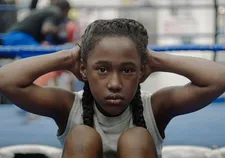 |
| On The Fits: 'The wonderful thing about that film for us what that it was already so experimental.' |
SJ: We're just cruising along. We're so happy with all the things that we're doing and the films are coming in.
AW: I've started going to films that I know you are scoring because you're both pretty good judges.
DB: That's a good point. We've started turning films down because it's just not going to be something that we can contribute to. We're getting better at that. We're becoming better film critics.
AW: You've mainly done indie films are you tempted to do something bombastic. If somebody came up to you and asked you to do the next James Bond, would you?
SJ: Totally. One hundred per cent. That's something that really excites us. We want to get into that because I think we have a new voice to bring to that. We wouldn't do your regular Hollywood score with a normal orchestra. I mean, we love to use orchestra but we do it in our own way. We have this way of layering our stuff and finding new sounds.
DB: Even if Disney said, 'You have to promise and be bound by contract to use the orchestra and have a specific sound.' Still, we'd figure out how to do it.
AW: So, you're still based in New York, you're not tempted to go across the country to LA?
DB: We're tempted.
SJ: Every day.
AW: Do you think it holds you back at all, being on the other side of the country?
DB: I don't think so. We were kind of wondering that a couple of years ago, but not so much any more.
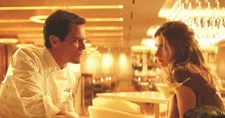 |
| On Frank & Lola: 'There's a melody that's established at the beginning and that's played around with even in the darkness and turmoil, it comes in very symphonically' |
DB: I think we both kind of want to live in LA. We'd like to try it and see, we don't know how it would turn out.
AW: It would be a big move, though, as you'd be leaving your existing network behind in a way.
SJ: Ideally we'd like to have a space we could come back to in New York and work if we need to.
AW: I haven't seen Frank & Lola yet, so you tell me what the score is like.
DB: Jazzy. It's hard to explain because we're not really jazzy people but the opening cue and closing credits have this double bass and high hat and guitar and it sounds like a nightclub small trio. A lot of that comes with orchestra – a string section that takes us through the second, third and fourth cues and it gets very classical romantic very quickly because we've fallen in love with Frank and Lola's affection for each other and they develop a relationship. Then the story continues and we go into our more common percussion stuff.
SJ: But there is a pretty substantial string orchestra that's going throughout the whole thing.
DB: There's a melody that's established at the beginning and that's played around with even in the darkness and turmoil, it comes in very symphonically. Then they sort of try to get back together and that culminates in orchestra. It's a good score and it's full of ups and downs – I can't wait to watch it.
SJ: We haven't seen it mixed, it'll be fun.
AW: Anna Rose Helmer told me you hadn't seen the finished Fits until the other day. What did you think?
SJ: I had the best time watching that movie. We were saying the other day, it was one of those rare times when we could step outside and watch the movie as a spectator without obsessing about what cue was coming next. Chris Foster, the sound designer, did a phenomenal job.
AW: So, do you think you've learnt anything in the past year?
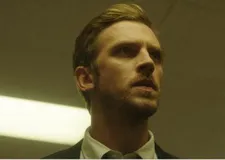 |
| On Dan Steven's The Ticket: 'It's a really well made film, so we're excited about that.'
|
AW: And he's like, 'Damn. I gave him one lesson and now I'm out of a job'?
DB: We hired him for Christine. We learned things on Christine. The score sounded really good just with midi harp and some mini clarinets that we had. When you hire everybody and sit down with then and get everything live, it really just flourishes. We've got to make sure to always do that.
SJ: One thing we've been afforded, I think because we've been working so much, is... We do a lot of movies at the same time so we can make our rent and stuff but I think the more movies we're doing at a time, we can use those budgets interchangeably for musicians. Some of the movies have higher budgets than others so we can use one budget to help another. It's really become an important part of our process. We used to just play but now we really try to have fun.
AW: It must be quite a kick to think you're still learning about instruments.
SJ: That's what keeps us going. We're working with a vocalist for our new film – The Autopsy Of Jane Doe [directed by Troll Hunter's André Øvredal], it's a horror film. There's very weird, avant garde choral stuff on it. So it's kind of fun.
After Jane Doe, there's a movie called The Ticket that we're really excited about. That's a new director Ido Fluk. It stars Dan Stevens and Malin Akerman and it's about a man who's born blind and gets his sight back. It's a really well made film, so we're excited about that.
- Christine will be distributed in the US by The Orchard.
- The Fits is released in the UK on February 24 - read what Anna Rose Helmer told us about the film here.
- Frank & Lola will be distributed in the US by Universal and internationally by Arclight. For more information visit the official site
- The Ticket is currently in production, see Ido Fluk's Tumblr for details
- The Autopsy Of Jane Doe is in post-production





















